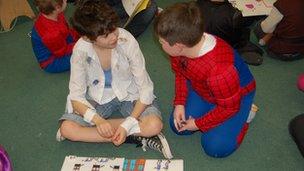Children's reading 'pushed out' by other activities
- Published

The survey found more than half of children enjoyed reading but fewer than a third read outside school
Children are reading less as their lives become more crowded with other activities, new research suggests.
They are reading fewer novels, comics, magazines and websites, according to a National Literacy Trust study of 21,000 children and teenagers.
While many enjoyed reading, some 17% said they would be embarrassed if a friend saw them with a book.
A government spokesman said the findings showed the need to help young people develop a love of reading.
Half of those questioned said they enjoyed reading very much, or quite a lot, almost the same as in 2005 when the figure was 51%.
But the findings showed that just three in every 10 youngsters read daily in their own time, down from four in 10 in 2005.
More than a fifth (22%) said they rarely or never read in their own time and more than half (54%) said they preferred watching television to reading.
In 2005 more than three quarters (77%) of children read magazines, but now only 57% do.
Comic reading has dropped from 64% to 50%, and reading on websites from 54% to 50%.
The researchers said the figures highlighted "a clear issue with children's leisure time with many children enjoying reading but pushing it out in favour of other activities".
'Essential' reading time
Jonathan Douglas, director of National Literacy Trust, said: "The fact that children are reading less than in 2005 signals a worrying shift in young people's literacy habits. We are calling for the Government to back a campaign to halt this reading decline and to give children time to read in their daily lives.
"We need to make reading irresistible. We want to call on families and professionals working with children and young people to make ten minutes in their day for reading."
The report said it was "essential" for children to make time to read because reading outside lessons was linked to strong academic achievement.
It added that young people who read outside class on a daily basis were 13 times more likely to read above the expected level for their age.
A spokesman for the Department for Education said: "The findings of this survey come as no surprise and shows that we need to continue our drive to encourage young people to develop a love of reading. In a world of so many distractions for young minds, the place of literature is more important than ever.
"Children need to master the basics of reading as early as possible in primary school so they can then go on to explore magical and powerful books such as Private Peaceful, Harry Potter, and, in good time, books such as Lord of the Flies, Animal Farm and those by Charles Dickens.
"That's why we've introduced a short and simple phonics check at the end of Year 1 to make sure children have mastered the basics."
The study, which coincides with International Literacy Day on Saturday, comes as the World Literacy Foundation called on world leaders to tackle a global literacy crisis.
Chief executive Andrew Kay said: "Globally, almost 800 million people are illiterate and 100 million children don't attend school each day".
- Published2 July 2012
- Published22 May 2012
- Published5 December 2011
- Published23 August 2011
- Published14 June 2011
- Published31 May 2011